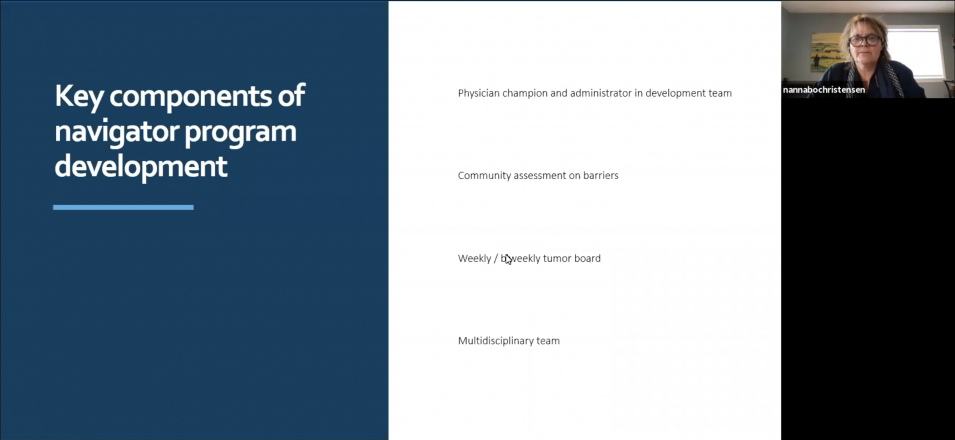Oncology nursing students and faculty discuss nurse navigator duties and responsibilities
Oncology nursing program students, practitioners, and professors discussed the role of oncology nurse navigators in an online lecture organized by the Faculty of Pharmacy, Nursing and Health Professions at Birzeit University, together with Laura Mandel from the United Nations Population Fund (UNFPA) in Jerusalem, on Saturday, January 9, 2021.
The lecture was led by Nanna Bo Christensen, a certified oncology nurse navigator with specific training on breast cancer at the Boulder Community Hospital in Boulder, Colorado, USA. She discussed the responsibilities and duties of oncology nurse navigators and outlined her experience as one of the founders of the nurse navigation development program at the Boulder hospital.
Chairing the session, Dr. Sahar Hassan, dean of the Faculty of Pharmacy, Nursing and Health Professions, gave a brief overview of the faculty’s Master’s Program in Oncology Nursing, which aims to train competent oncology nurses who can provide holistic and high-quality cancer care for Palestinian cancer patients and their families. In Palestine, she noted, the addition of an oncology nurse navigator position will make cancer patients’ treatment journey easier and less complicated than it normally is.
The program, added Hassan, is interdisciplinary in nature, combining concepts and approaches from multiple disciplines related to nursing science and oncology. The program offers courses that cover cancer nursing care, cancer diagnosis and prevention, treatment modalities, and palliative care, among other areas.
Christensen, who started her career in pediatric trauma and worked as an oncology nurse for 15 years, discussed the three main pillars that constitute the role of oncology nurse navigator: education, support, and navigation.
As the primary link between patients and oncologists or other physicians, oncology nurse navigators are often the patients’ first point of contact after diagnosis. The navigators answer patients’ questions and explain their treatment options, explained Christensen, adding that they strike a balance between providing patients with the details needed to make the best decisions regarding their treatment and support options while exercising care not to overwhelm them with information.
Additionally, oncology nurse navigators provide patients with the mental, emotional, and physical support needed throughout all stages of their treatment, helping them navigate the cancer diagnosis and available treatment plans.
Due to its duties and responsibilities, the job of an oncology nurse navigator is very involved and demanding, stressed Christensen, as it requires nurses to guide patients through what might be some of the most stressful periods of their lives.
These characteristics are reflected in the job’s requirements, such as the need for great communication and teamwork skills, in-depth knowledge of cancer pathology as well as treatment options and plans, and certification in chemotherapy or biologic treatment, among other requirements.
Christensen completed her discussion with an explanation of how the nurse navigator training program is developed, noting that the core team administering the program should comprise physicians of different specialties, such that nurses receive comprehensive education and training. The program should also include a weekly or bi-weekly tumor board meeting, in which oncologists, surgeons of different specialties as well as clinical trial experts meet to discuss cancer cases and present the best course of action for patients.
Such multidisciplinary focus, Christensen added, helps trainees develop a wider perspective through which they could better understand the sometimes complex treatment options and, as such, provide more suitable care and advice for patients.
At the end of the lecture, Dr. Hassan, the faculty dean, opened the floor for questions from the attending students, faculty members, and health care practitioners and experts.









